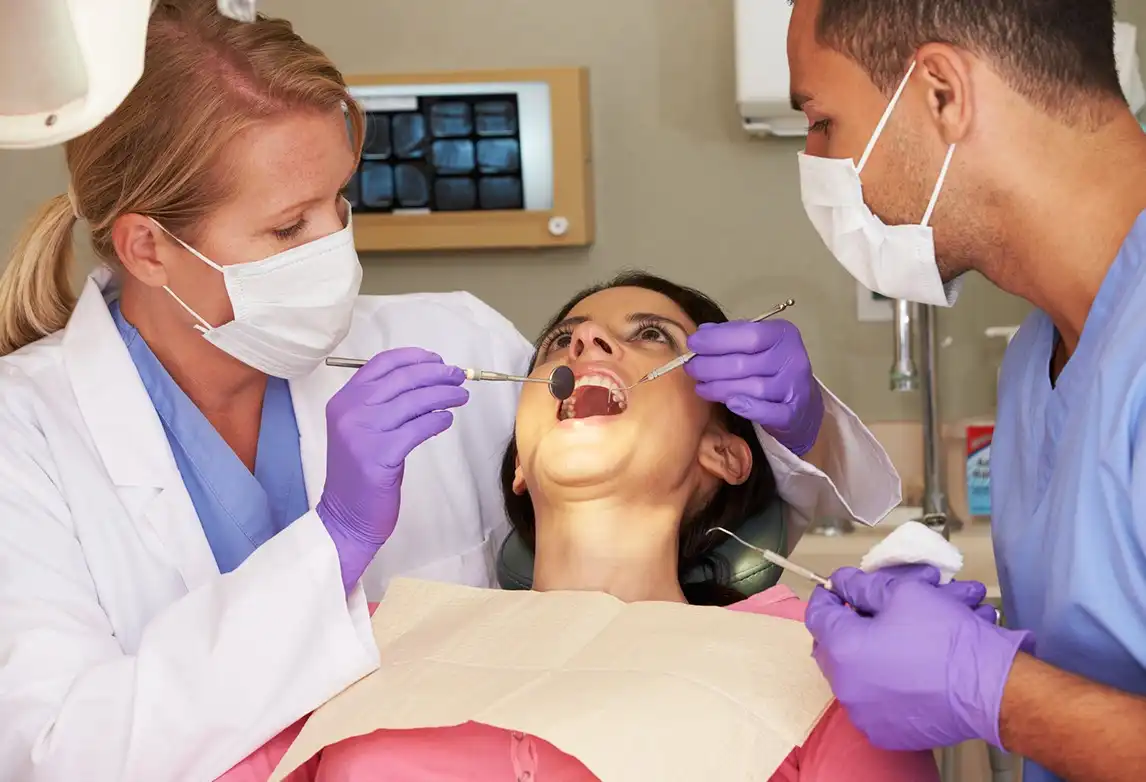Your Guide to Healthcare Careers

Healthcare Industry Overview
Healthcare is an essential part of everyday life and can have a positive impact on your community as well as others. Patients need proper care from compassionate workers, and healthcare providers need to find the right people to fill those positions.
As people get older, their healthcare needs often increase. This creates a higher demand for all kinds of allied health services. That's why healthcare is a field with so many career opportunities.
Career growth isn't the only reason many choose to work in the healthcare field. It's also a field that lets you help others and/or facilities that provide care. Healthcare professionals have the opportunity to make a difference. It can be a career path that provides a sense of personal fulfillment.
This guide can help you navigate through your journey toward pursuing a career in healthcare. Learn how to find a good path for you, and the education you'll need to follow that path. Discover career path options and tips for landing a job as well.
Choosing a career is a major decision that requires thought and planning. Use this guide to help you think through your options and find the career that meets your needs. Once you know what you want to do, this guide offers actionable steps to help you reach those career goals.
13 percent
Projections from the U.S. Bureau of Labor Statistics (BLS) show that healthcare jobs are expected to increase by 13% from 2021 through 2031.1
Don't Have Time to Read the Guide Right Now?
Send Me the Career Guide
Is Healthcare for You?

Start your career path by asking yourself a few questions. Do you want a career that allows you to help others? Are you looking to work in a field with higher-than-average projected career growth in the coming years? Would you like to choose from a variety of potential career options?
If you answered “yes” to any of those questions, then healthcare could be a good career fit for you. It can be difficult to know where to start since there are so many types of healthcare careers to pursue. A simple first step is to look at the broad career paths and see which ones fit best with your needs and goals. Here are a few overviews of the different fields in healthcare:
Allied Healthcare Overview
Allied healthcare is a field with a lot of potential career options. Some of the positions involve direct patient care. Other allied health careers focus on assisting healthcare practitioners and helping healthcare offices and facilities run smoothly. Others allow you to work with electronic healthcare records and healthcare technology. Careers in allied healthcare can suit a variety of skill sets since there are so many different paths to pursue. Medical assistants, pharmacy technicians, and medical billing and coding professionals are just some of the examples of allied health careers.
2 million
It's an exciting time to pursue a career in healthcare. The healthcare field is projected to add 2 million new jobs through 2031.2
Healthcare Technology Overview
Advances in technology impact the entire healthcare field. Some healthcare options let people build a career around the technology they love. Many people find an opportunity to build a career in healthcare technology as a result of technology improvements. There are positions that focus on healthcare technology systems while other jobs deal with healthcare technology support. Many roles also work with electronic healthcare records and management systems to help keep patient records accurate and private.
Healthcare Management Overview
Hospitals, healthcare facilities, and other healthcare practices need strong leadership. Consider healthcare management if you're driven, organized, and good at communication. Healthcare management may include budgeting, creating processes, communicating with leadership teams, managing healthcare staff, and other business-related responsibilities. Careers in healthcare management include office managers, front desk supervisors, medical records clerks, and accounts receivable specialists. There are a variety of leadership positions available in the healthcare management field that you can work toward.
I had been using every excuse in the book not to go back to school, including I had been out of school for too long and I couldn't do it … I graduated in January with a 4.0 and I'm super proud of myself.
How To Find The Career Path That Fits Your Interests

Now that you have a broad overview of the career options in healthcare, it's time to narrow down your choices. Answer these questions to help point you toward a career path that fits your interests.
- How long do you want to attend school?
- What kind of salary suits your lifestyle?
- What is the career outlook for your desired position?
These questions can help you find the career option to best meet your needs. This guide uses data from the U.S. Bureau of Labor Statistics to explain education requirements, salary information, and job outlook projections for different healthcare careers.
You might also want to keep in mind where you intend to live in the future. Some cities may have an increased need for certain positions. It can be helpful to know if particular positions are in demand where you plan to live and work.
Healthcare Career Options
Deciding your general career path can help you figure out what you want from a healthcare career. Next, you can narrow down the specific career options that meet your needs.
Here are some promising career options in the healthcare field. Use the provided data from the U.S. Bureau of Labor Statistics to find the career that matches what you're looking for.

The Healthcare Industry is Growing!
Complete this form, and you'll receive UMA's Definitive Guide to Healthcare Careers as well as information on how to get started at UMA. We'll also give you a call to answer any questions.
Medical Biller and Coder

Medical billers and coders support healthcare providers, helping them collect payments for their services in a timely manner. Medical coders assign each diagnosis and procedure a universal identifier using standard industry codes. Once patient records have been properly coded, medical billers send the invoice or claim to the insurance company or other payer for reimbursement. Most medical billers and coders work full-time in an office setting at a healthcare practice, hospital, or clinic.
Education Requirements for Medical Billers and Coders
According to the BLS, medical secretaries typically learn industry-specific terminology and practices by attending classes at community colleges or technical schools. Online programs are also available. While formal education is generally required to obtain the relevant skills and knowledge, medical billing and coding training can be completed in a matter of months, depending on the individual student. Some employers prefer candidates with relevant certifications, such as the Certified Professional Coder (CPC®) credential.
Job Options for Medical Billers and Coders
Medical billers and coders perform a specialized role in today's healthcare practices. Job titles in this field include medical office assistant, insurance benefits specialist, and medical biller and coder.
8 percent
While overall employment of secretaries and administrative assistants is expected to decline by 8% from 2021 to 2031, the BLS projects employment of medical secretaries will increase 8% over the same period.3
$38,500
As of May 2022, the median pay for this profession — which the BLS classifies as medical secretaries — was $38,500 per year, or $18.51 per hour.4 This means roughly half of the workers in this occupation earn less, and half earn more.
Note: UMA's graduates in the 2021-2022 cohort of its Medical Billing and Coding diploma and associate degree programs reported to UMA that they earned a median hourly wage that is approximately at or slightly higher than the BLS's lowest decile. Earnings information was typically obtained by a self-report from the graduate, and occasionally from the graduate's employer or other sources.
Skills Needed For Medical Billers And Coders
Medical billers and coders require many of the same skills as other secretaries and administrative assistants, in addition to specific knowledge related to their profession:
- Understanding of accounts receivable (AR) processes and healthcare records
- Proficiency with computers, including billing and coding programs, and recordkeeping systems
- Knowledge of medical terminology and related industry codes
Dental Assistant

Dental assistants do a variety of tasks to help dental practices run smoothly. They work with patients and may help keep office records and schedule appointments. A dental assistant works in a dentist's office. Dental assistants may also sometimes work in schools, hospitals, or nursing homes.
Education Requirements For Dental Assistants
The exact education requirements for dental assistants vary from state to state. However, the BLS states that this position usually requires graduation from an accredited program and for the student to pass a certification exam. For some states, it could be a one- or two-year program from a vocational or dental assistant training school.
Job Options For Dental Assistants
Dental assistants may find work in a specialized position. For example, pediatric dental assistants specialize in working with young patients, while surgical dental assistants assist during dental surgery. These specialized positions may require additional skills or job experience.
8 percent
The BLS estimates that the need for dental assistants will increase by 8% from 2021 to 2031.5
$44,820
As of May 2022, dental assistants earned a median wage of $44,820, or $21.55 per hour.6 That means half of the workers in this occupation earned more, and half earned less.
Note: UMA's graduates in the 2021-2022 cohort of its Dental Assistant with Expanded Functions diploma and associate degree programs reported to UMA that they earned a median hourly wage that is approximately at or slightly higher than the BLS's lowest decile. Earnings information was typically obtained by a self-report from the graduate, and occasionally from the graduate's employer or other sources.
Skills Needed For Dental Assistants
According to the BLS, some skills that dental assistants need include:
- Focus on details
- Listening skills
- Ability to work with your hands
- Organization skills
- Good interpersonal abilities
Phlebotomy Technician

Phlebotomy technicians, also referred to as phlebotomists, are responsible for drawing blood from patients. This could be for routine tests, medical research, blood transfusions, or blood donations. Hospitals are the most common place for phlebotomists to work. Other common workplaces include laboratories, doctor's offices, and blood donor facilities. Phlebotomists often work full-time.
Education Requirements for Phlebotomists
Certification is often a requirement to work in phlebotomy. Vocational and career training schools, technical schools, and community colleges are popular options for phlebotomy programs. These programs typically combine work in the classroom with hands-on clinical work. Students can typically complete phlebotomy programs in four months to one year.
Job Options for Phlebotomists
Sometimes there are advancement opportunities available in the phlebotomy field. These positions could require additional experience, training, and/or education.
10 percent
Bloodwork is a critical part of the healthcare industry. It is used to help diagnose patients and perform crucial medical research. That demand is why phlebotomists are expected to have a 10% increase in jobs from 2021 to 2031, according to the Bureau of Labor Statistics.7
$38,530
As of May 2022, the median wage for this job was $38,530, or $18.53 an hour.8 That means half of the workers in this occupation earned more, and half earned less.
Note: UMA's graduates in the 2021-2022 cohort of its Phlebotomy Technician diploma program reported to UMA that they earned a median hourly wage that is approximately at or slightly higher than the BLS's lowest decile. Earnings information was typically obtained by a self-report from the graduate, and occasionally from the graduate's employer or other sources.
Skills Needed for Phlebotomists
Phlebotomists need these skills, according to the BLS:
- Dexterity
- Caring toward others
- Good interpersonal skills
- Ability to focus on details
Pharmacy Technician

Pharmacy technicians are instrumental in pharmacies. They help fill prescriptions and patients get the medicine they need. Pharmacy technicians work in pharmacies, which could be located in drug stores, retail establishments such as grocery stores, or hospitals.
Education Requirements for Pharmacy Technicians
Many states/employers require pharmacy technicians to pass an exam and/or participate in formal education. Technical or career schools can help students learn the skills they need to become a pharmacy technician. These programs may be completed in 12 to 18 months, though students can go on to get an associate degree if they choose, which could potentially make them more competitive candidates.
Job Options for Pharmacy Technicians
Pharmacy technicians could work in retail settings, hospitals, or even mail-order facilities. Though the basic job is the same, there could be varying duties based on the specific workplace.
5 percent
Pharmacy technicians are expected to see a 5% increase in hiring from 2021 to 2031, according to the Bureau of Labor Statistics.9 This is as fast as the average job growth that the BLS projects across all occupations.
$37,790
The BLS reports that as of May 2022, this position had a median salary of $37,790, or $18.17 per hour.10 That means half of the workers in this occupation earned more, and half earned less.
Note: UMA's graduates in the 2021-2022 cohort of its Pharmacy Technician associate degree program reported to UMA that they earned a median hourly wage that is approximately at or slightly higher than the BLS's lowest decile. Earnings information was typically obtained by a self-report from the graduate, and occasionally from the graduate's employer or other sources.
Skills Needed for Pharmacy Technicians
According to the BLS, pharmacy technicians need the following skills:
- Attention to detail
- Basic math skills
- Good listening skills
- Organization skills
- Strong customer service
Nursing Assistant

Nursing assistants help to care for patients. They assist with tasks like checking patients' vital signs and helping patients stay clean. Different workplaces may offer different responsibilities such as giving patients their medicine and helping them to eat. Some nursing assistants work in hospitals. Others work in nursing homes or other residential facilities. This is most often a full-time job and may require working nights, weekends, and holidays.
Education Requirements for Nursing Assistants
Each state has its own specific program requirements and competency exams needed to become a nursing assistant. These programs are offered at a variety of schools such as high schools, community colleges, and vocational/career training schools. Some nursing homes or hospitals may offer their own programs as well. Once you've completed the state-approved program, you must meet eligibility requirements and pass a competency exam, which usually results in licensure/certification and places you on the state registry.
Job Options for Nursing Assistants
Nursing assistants are sometimes known as nursing aides or Certified Nursing Assistants, depending on the state and passing a required certification exam.
5 percent
Nursing assistants are projected to see a 5% increase in available jobs from 2021 to 2031, according to the BLS.11 This increase is due in part to the rising number of baby boomers reaching an age that requires more medical attention.
$30,310
As of May 2021, the BLS reports that nursing assistants made a median of $30,310 a year.12 That means half of the workers in this occupation earned more, and half earned less.
Note: UMA's graduates in the 2021-2022 cohort of its Nursing Assistant diploma program reported to UMA that they earned a median hourly wage that is approximately at or slightly higher than the BLS's lowest decile. Earnings information was typically obtained by a self-report from the graduate, and occasionally from the graduate's employer or other sources.
Skills Needed for Nursing Assistants
Nursing assistants require skills like:
- Strong communication
- Ability to provide compassionate care
- Ongoing patience for the people being cared for
- Ability to handle physical tasks and stay on your feet during your shifts
Medical Assistant

A medical assistant does a combination of clinical work and administrative tasks. They may work in doctors' offices, hospitals, or other healthcare facilities. Their specific job duties depend on the size and specialty of their workplace. They may take patients' vital signs, schedule patient appointments, assist physicians during patient exams, and record basic patient information.
Education Requirements for Medical Assistants
According to the BLS, most states prefer to hire medical assistants who have completed formal education. There are programs available from vocational schools, technical and career training schools, and community colleges. There are one and two-year programs available. Students typically study in the classroom, train in the laboratories, and complete an externship course in the field under the supervision of healthcare supervisors.
Job Options for Medical Assistants
A medical assistant's workplace helps to determine what their daily job looks like. Medical data assistants focus on appointment setting, data entry, and coding for insurance. Clinical assistants help doctors and work with patients. Some medical assistants have a blend of administrative and clinical responsibilities.
16 percent
Medical assistants are in the midst of major employment growth. BLS projections show that medical assistant jobs should increase by 16% from 2021 to 2031.13
$38,270
As of May 2022, they earned a median annual wage of $38,270, or $18.40 per hour.14 This means that about half of the workers in this occupation earned more, and half earned less.
Note: UMA's graduates in the 2021-2022 cohort of its Medical Assistant diploma and associate degree programs reported to UMA that they earned a median hourly wage that is approximately at or slightly higher than the BLS's lowest decile. Earnings information was typically obtained by a self-report from the graduate, and occasionally from the graduate's employer or other sources.
Skills Needed for Medical Assistants
Medical assistants require skills like:
- Attention to detail
- Ability to analyze medical data and code medical records
- Technical ability with instruments needed to take vital signs
- Skills for interacting with people
Medical Administrative Assistant

Medical administrative assistants help take care of many of the tasks that help a healthcare facility run smoothly. This includes gathering patient information, scheduling appointments, verifying insurance information, and updating patients' medical records. Medical administrative assistants also help with other office-related tasks, such as answering phones, sharing documents with other healthcare entities, and more.
Education Requirements for Medical Administrative Assistants
While administrative assistants in other fields often learn on the job, medical administrative assistants may require additional training. This training helps individuals in these roles learn the technology they'll likely encounter when working in a healthcare setting.
Job Options for Medical Administrative Assistants
Medical administrative assistants can have a variety of different titles. Medical receptionists and insurance benefits specialists often perform many of the same types of job functions. A customer service representative is another similar title.
8 percent
While employment in the field of secretaries and administrative assistants is experiencing an 8% decline, the medical administrative assistant field is projected to grow 8% from 2021 to 2031.3
$38,500
As of May 2022, the median annual wage for medical administrative assistants was $38,500 per year, or $18.51 per hour.4 That means half of the workers in this occupation earned more, and half earned less.
Note: UMA's graduates in the 2021-2022 cohort of its Medical Administrative Assistant diploma and associate degree programs reported to UMA that they earned a median hourly wage that is approximately at or slightly higher than the BLS's lowest decile. Earnings information was typically obtained by a self-report from the graduate, and occasionally from the graduate's employer or other sources.
Skills Needed for Medical Administrative Assistants
The major skills needed for medical administrative assistants include:
- Ability to write accurately and with professionalism
- Interpersonal communication skills
- Organizational skills
- Good judgment and decision-making skills
Medical Office and Billing Specialist

Medical office and billing specialists perform a variety of office duties within healthcare settings. This includes managing the office's records and filing systems, processing insurance claims, and handling patient files. You can find medical office and billing specialists in physician's offices, hospitals, insurance companies, and a variety of other settings.
Education Requirements for Medical Office and Billing Specialists
Since medical office and billing specialists work with both patient and healthcare organization files and claims, some level of formal training or education may be needed to enter this role according to the BLS. This helps you learn the language used in the healthcare field, better preparing you for this type of role.
Job Options for Medical Office and Billing Specialists
Medical office and billing specialists can pursue a variety of positions. Among them are medical office assistant, medical receptionist, and insurance benefits specialist. Each of these positions performs similar functions as a medical office and billing specialist but uses a different position title.
8 percent
Medical office and billing specialist positions fall under the BLS category of medical secretaries and administrative assistants. While employment in the field of secretaries and administrative assistants is experiencing an 8% decline, the medical secretary and administrative assistant field is projected to grow 8% from 2021 to 2031.3
$38,500
As of May 2022, the median annual wage for medical billing and office specialists was $38,500, or $18.51 per hour.4 That means half of the workers in this occupation earned more, and half earned less.
Note: UMA's graduates in the 2021-2022 cohort of its Medical Office and Billing Specialist diploma and associate degree programs reported to UMA that they earned a median hourly wage that is approximately at or slightly higher than the BLS's lowest decile. Earnings information was typically obtained by a self-report from the graduate, and occasionally from the graduate's employer or other sources.
Skills Needed for Medical Office and Billing Specialists
The major skills needed for medical office and billing specialists include:
- Decision-making skills
- Ability to communicate with other staff and patients
- Organization
- Writing skills, such as good grammar and using a professional tone
Patient Care Technician

Patient care technicians are positions that work directly with patients. These positions are often full-time, according to the BLS, which includes these professionals under the title of home health aides. Patient care techs may work directly in people's homes, or in group settings like assisted living facilities or retirement communities. They help people in need with their daily activities and may work with people with chronic illnesses, disabilities, or other forms of impairment. Elderly people may also require the assistance of a patient care technician.
Education Requirements for Patient Care Technicians
The BLS explains that home health aides don't always have specific educational requirements. However, patient care technicians who are employed with certified agencies are often required to have training and take one or more certification exams. Some states require formal training, which is available from community colleges, vocational schools, elder care programs, and home healthcare agencies. If a home health agency gets reimbursed from Medicaid or Medicare, their employees must get proper training and pass an exam to get certified, according to the BLS. Some states also require specific certification. Community colleges and career training schools may offer training and certification for patient care technicians.
Job Options for Patient Care Technicians
The job options for patient care technicians depend on the needs of the patient. For example, some home health aides may provide basic care while others may have tasks that are specific to the patient, like help with prosthetic limbs. There may be some home health positions that require additional training for medical equipment that the patient needs, like ventilators for patients who have trouble breathing.
25 percent
Home health aides are expected to see massive hiring growth in the coming years due to the increased needs of the aging population, according to the BLS. This field is expected to see a 25% increase in jobs between 2021 and 2031.11
$30,180
Home health aides earned a median wage of $30,180 a year as of May 2022, or $14.51 per hour, according to the BLS.12 This means that about half of the workers in this occupation earned more, and half earned less.
Note: UMA's graduates in the 2021-2022 cohort of its Patient Care Technician diploma program reported to UMA that they earned a median hourly wage that is approximately at or slightly higher than the BLS's lowest decile. Earnings information was typically obtained by a self-report from the graduate, and occasionally from the graduates employer or other sources.
Skills Needed for Patient Care Technicians
Since home health aides work so closely with people, there are certain skills that are important to possess:
- Stamina to move patients when necessary and perform other physical tasks
- Ability to pay attention to details and follow specific patient care instructions
- Integrity and the ability to make patients feel comfortable
- Interpersonal skills that help you work with different personality types and various emotional states
Social and Human Service Assistant

Social and human service assistants help provide support in a number of fields, like rehabilitation, social work, and psychology. Since healthcare and human services are so interconnected, social and human service assistants can make a difference in the health and overall well-being of their clients. They work to help clients receive aid as needed, with everything from navigating Medicaid to finding assistance with daily needs like eating and personal hygiene. Employees in this field may work for private organizations, nonprofits, government organizations, or healthcare facilities, and typically work full-time. Social and human service assistants sometimes work on weekends and during the evenings.
Education Requirements for Social and Human Service Assistants
Social and human service assistants have varying educational requirements for employment. The BLS explains that even when a degree isn't a requirement, a certificate or an associate degree in the subject of human services is common for this position. Moreover, education can help you get additional responsibilities and may increase your chances for advancement in the field.
Job Options for Social and Human Service Assistants
There are many job titles in the same field as social and human service assistants. Some of these positions include:
- Member advocate
- Community support services/Residential associate
- Caregiver
- Direct support professional
- Behavioral or mental health technician
12 percent
The increased need for healthcare in the aging population is one of the reasons why the BLS projects that social and human service assistants will see a 12% increase in employment from 2021 to 2031.15
$38,520
The median annual wage for social and human service assistants as of May 2022 was $38,520 per year, or $18.52 per hour, according to the BLS.16 This means that about half of the workers in this occupation earned more, and half earned less.
Note: UMA's graduates in the 2021-2022 cohort of its Health and Human Services degree program reported to UMA that they earned a median hourly wage that is approximately at or slightly higher than the BLS's lowest decile. Earnings information was typically obtained by a self-report from the graduate, and occasionally from the graduate's employer or other sources.
Skills Needed for Social and Human Service Assistants
Some of the most important skills needed for social and human service assistants include:
- A compassionate personality in stressful situations
- Strong organization and communication skills
- The ability to solve problems and manage your time
- Interpersonal abilities in the face of sometimes difficult circumstances
Healthcare Accounting

If you enjoy working with numbers and have a passion for healthcare, you may want to consider pursuing a career in healthcare accounting. A career path in this field involves learning how to help healthcare organizations keep track of financial information, checking financial data for accuracy, and creating financial reports.
Education Requirements for Healthcare Accounting
Most bookkeeping and auditing clerks need some postsecondary education but can also learn some of their skills on the job. When supervised by another experienced employee, new clerks could learn how to complete their tasks. Basic math and computer skills are important to this role, in addition to knowledge of spreadsheets and bookkeeping software.
Job Options for Healthcare Accounting
Professionals in this field typically work in settings like physicians' offices, hospitals, healthcare facilities, and healthcare and insurance companies. Associate degree graduates can typically expect to pursue entry-level roles such as bookkeeper, accounting clerk, and accounting assistant.
-5 percent
From 2021 to 2031, bookkeeping, accounting, and auditing clerks are expected to see a 5% decrease in employment, according to the BLS.17
$41,100
As of May 2021, the median annual salary for bookkeeping, accounting, and auditing professionals in the healthcare and social assistance industry was $41,100, according to the BLS.18 This means that about half of the workers in this occupation earned more, and half earned less.
Note: UMA's graduates in the 2021-2022 cohort of its Healthcare Accounting associate degree program reported to UMA that they earned a median hourly wage that is approximately at or slightly higher than the BLS's lowest decile. Earnings information was typically obtained by a self-report from the graduate, and occasionally from the graduate's employer or other sources.
Skills Needed for Healthcare Accounting
- Comfortable working with numbers
- Proficiency with computers, including spreadsheets and relevant software
- Ability to keep information confidential
- Attention to detail
Health Information Management

This role may be referred to as health information technicians. They help keep health data well-organized, accurate, and updated so physicians can make sound medical decisions and provide informed care. They may also answer telephones, copy or file documents, and verify insurance. Health information technicians often work full-time.
Education Requirements for Health Information Technicians
A diploma or an associate degree is usually required to land a position as a health information technician, according to the BLS. Many positions require official certification before being hired or shortly after becoming employed in this field.
Job Options for Health Information Technicians
Health information technicians go by many names. Position titles in this field include medical receptionist or medical office assistant. Health information technicians may be employed in a variety of locations, like hospitals, doctors' offices, and nursing homes.
7 percent
Health information technicians have a positive job outlook, according to the BLS. This position is expected to see a 7% increase in employment from 2021 to 2031.19
Skills Needed for Health Information Technicians
The major skills needed for health information technicians include:
- Being analytical
- Confidentiality
- Attention to detail
- Interpersonal abilities
Succeeding in School

Once you begin school, you're on the path toward pursuing a healthcare career. It's exciting! To acquire the education you need for the career you're working toward, success in school is a must. But if you haven't been in school for a while, you may not know what to expect. That's okay. There are plenty of resources available to help you succeed in school.
To start, bookmark these blog posts:
- 5 Easy Time Management Tips to Be More Productive
- 7 Ways to Appreciate (and Even Enjoy) the Educational Process
Organization and time management can make it much easier to get your classwork and homework done. But if you need extra help, your school may have some resources to help you.
Look for a School That Offers Support

Some schools offer in-depth resources to help their students succeed. Ideally, you want a school that invests in your success and is willing to offer help to make sure you meet your goals. Find out if there is a dedicated student success team at your school.
Some things to look for include:
- Tutoring
- Help with assignments
- Access to online education resources like eBooks, medical journals, and reference articles
- Learning labs to help you understand the course material
- Certification/licensure exam preparation
Success is more than just doing well in class. Sometimes life will challenge you in ways that may impact your education. Maybe you're having a hard time balancing school and work. It could be that family problems or health issues are getting in your way. No matter what the issue is, try to find a school that is dedicated to helping you to find a way through it. Some schools offer student services to help guide you through problems that may come up. These student services can make a big difference in your education experience. School can be a lot less stressful when you know that there is a team available to help you.
Pursuing a Role In Healthcare

So, you've decided to work toward pursuing a career in healthcare, and you've chosen an educational opportunity. Once you earn your diploma/degree, you'll be in a better position to begin your job search.
Job interviews are often nerve-wracking. But the good news is, with preparation and practice, you can develop strong interviewing skills.
Here are some things to work on before you apply for a job:
- A cover letter and resume personalized toward the job you're applying for
- Interview preparation
- Wardrobe choices for your job interview
Some schools will help you with everything you need to prepare for the job application process, the interview, and even the first 30 days on the job. Check with your school's career services department to see how they can help you.
Mock interviews can be especially helpful. Through these practice sessions, you can begin to understand the sort of questions that the interviewer may ask you — and how you should answer them.
Because of UMA's career services, I now have a job working in my career specialty … UMA has been my lifeline and it's been an amazing experience.
Bookmark these blog posts for job search advice on body language, interviewing, and more:
- How to Overcome Interview Anxiety
- Preparing for a Job Interview
- 5 Surprising Interview Tips
- Tips for Writing Thank You Notes After Your Interview
- A Complete Guide to the Interview Process
How UMA Can Help

Ultimate Medical Academy (UMA) offers several healthcare diploma and degree programs, many of which can prepare you to fill roles like the ones referenced in this career guide. UMA is a care-forward institution and our staff is always ready and willing to do what we can to help you land and succeed in your desired healthcare role.
Some benefits offered by UMA include:
- Providing students with teams to support them during and after graduation
- Working with employer partners who prefer to hire UMA grads
- Offering access to Continuing Medical Education (CME) opportunities
- Supporting and promoting a diverse learning environment
I would tell anybody who's afraid to start, to never give up on you, never give up on your dreams … It's never too late. No matter what obstacles, no matter what's going on, always follow your heart.
Graduation is only the beginning. Get ready to go out there and find the job you've been working toward. Keep this guide handy to help you on your way and contact your school if you have any questions or need any assistance.
Also, contact us if we can be of any assistance. We look forward to learning how we can help you achieve your healthcare career goals. In the meantime, good luck with all your professional endeavors. You've got this!
Download the Healthcare Career Guide and read it later.
Send Me the Career Guide